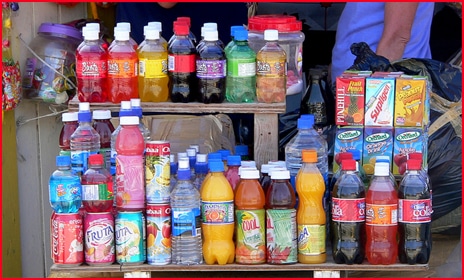
We are looking at the basic components of the controversy over taxing soda pop. Last time, we talked about why sugar-sweetened drinks, or SSDs, are particularly being singled out as childhood obesity villains, and how different jurisdictions have handled the question or are planning to address it. Now, let’s look at the corporate attitude, whether the soda tax can make a difference, and where the anti-soda movement might go from here.
Johnny Diaz, staff writer for The Boston Globe, tells us that 69% of Massachusetts voters are in favor of taxing soda, if the proceeds go to obesity reduction programs. He reports on a gathering of the Boston College Chief Executives’ Club where the city’s movers and shakers were addressed by Pepsi CEO Indra K. Nooyi, who was recently named by Fortune magazine as the most powerful woman in business. The soda tax topic was not in her speech, but was brought up during the question-and-answer period. Diaz quotes Nooyi as saying,
Those are very complex issues. If you’re dealing with revenue, this is the wrong way to go about it. If you are worried about obesity, it’s a broader issue. You have to worry about the quality of school lunches. You have to talk about nutritional labeling.
Well, what else could she say? Dr. Pretlow recalls the fate of Washington state’s 2% tax on soda and candy. The American Beverage Association sponsored a ballot initiative to cancel the tax, spending $12 million on such traditional tools as misleading TV commercials that claimed the state was unfairly taxing food. Guess what? The corporate interests succeeding in revoking the tax is a blow for the anti-childhood-obesity efforts.
In Overweight: What Kids Say, Dr Pretlow mentions a 2008 study by Janet E. Whatley Blum showing that limiting the availability of soda in schools doesn’t influence how much of it is drunk. That research team worked with four schools in Maine that reduced the availability of SSDs and three schools that did nothing. Yes, it is possible to set things up so kids don’t get their hands on so much soda pop at school. But it doesn’t seem to change their overall behavior that much. Although, if nothing else, a soda drought could prevent a lot of tooth decay, another side effect suffered by overweight kids.
The research was summarized in ScienceDaily, which said,
Researchers found that reduction or elimination of SSB from school menus has little effect on total consumption by adolescents… Consumption of SSB decreased in all students, regardless of whether they attended an intervention or control school.
But there is still hope. A report called “Sugar-Sweetened Beverage Taxes and Public Health,” available online as a PDF file, suggests that the answer is higher taxes. Modest taxes (say, 5%) on SSBs and/or junk food may help fund some anti-obesity pep rallies, but a real difference can be made only by a hefty tax rate. At least this is the theory, based on how tobacco smoking has decreased since taxes were made punitively high. According to the report,
In addition, while there is only limited research on the impact of taxes on SSB consumption rates and related weight outcomes, existing research on the impact of prices on food-purchasing behaviors in general suggests that substantive taxes on SSBs could significantly affect consumption patterns and thereby have an impact on overweight and obesity rates.
So the thinking is that the only effective measure is to raise the tax a lot. Getting back to Brownell and Frieden of Yale (see Part 1 of this post), they wrote:
Given the heavy consumption of sugared beverages, even small taxes will generate substantial revenue, but only heftier taxes will significantly reduce consumption… Perhaps the most defensible approach is to use revenue to subsidize the purchase of healthful foods. The public would then see a relationship between tax and benefit, and any regressive effects would be counteracted by the reduced costs of healthful food.
They also dryly noted,
Studies that do not support a relationship between consumption of sugared beverages and health outcomes tend to be conducted by authors supported by the beverage industry.
Yes, there are conflicts of interest in this area of the struggle to end childhood obesity. Many interesting things happen in the realm of soda pop reform. The nonprofit advocacy group Save the Children gave up on its taxation efforts in four states and the District of Columbia after receiving a $5 million grant from Pepsi. This transaction may or may not represent a conflict of interest. The group can probably do a lot of good for kids with that money, like try to convince them not to drink soda pop. We are not to worry, because it means nothing:
The non-profit’s chief operating officer, Carolyn Miles, told The New York Times that there is no connection between the group’s about-face on soda taxes and the funding opportunities with the soft drink giants.
Your responses and feedback are welcome!
Source: “Pepsi CEO: Don’t tax soda,” The Boston Globe, 05/13/11
Source: “Eliminating Soda From School Diets Does Not Affect Overall Consumption,” ScienceDaily, 11/11/08
Source: “Sugar-Sweetened Beverage Taxes and Public Health” (PDF), Bridging the Gap Research, July 2009
Source: “Ounces of Prevention — The Public Policy Case for Taxes on Sugared Beverages,” NEJM, 04/30/09
Source: “Save the Children Switches from Soda Tax to Coke and Pepsi,” AllGov.com, 12/20/10
Image by Lee Coursey, used under its Creative Commons license.

 FAQs and Media Requests:
FAQs and Media Requests: 











